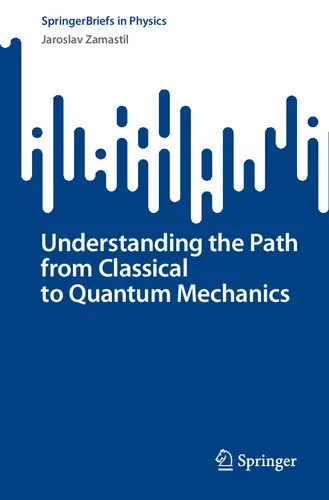Understanding the Path from Classical to Quantum Mechanics
4.6
بر اساس نظر کاربران

شما میتونید سوالاتتون در باره کتاب رو از هوش مصنوعیش بعد از ورود بپرسید
هر دانلود یا پرسش از هوش مصنوعی 2 امتیاز لازم دارد، برای بدست آوردن امتیاز رایگان، به صفحه ی راهنمای امتیازات سر بزنید و یک سری کار ارزشمند انجام بدینمعرفی کتاب "Understanding the Path from Classical to Quantum Mechanics"
کتاب "Understanding the Path from Classical to Quantum Mechanics" به قلم یاروسلاو زاماستیل، یکی از برجستهترین منابع در زمینه درک گذار از مکانیک کلاسیک به مکانیک کوانتومی است. این اثر، یک راهنمای جامع برای دانشجویان، پژوهشگران و علاقهمندان به علم فیزیک است که تلاش میکند با زبان ساده اما دقیق، پیچیدگیهای جهان فیزیک کوانتوم را توضیح دهد و پل ارتباطی میان دیدگاههای کلاسیک و مدرن در علوم فیزیکی ایجاد کند.
خلاصهای از کتاب
این کتاب در بخشهای مختلف، اصول مکانیک کلاسیک و روشهای بنیادی آن را معرفی میکند و سپس به تشریح چالشهایی میپردازد که باعث شد مکانیک کلاسیک دیگر برای توضیح برخی پدیدههای فیزیکی کافی نباشد. نویسنده در ادامه، به مفاهیمی مانند محدودیت مدلهای کلاسیک در ابعاد کوچک، ظهور اثرات کوانتومی و نیاز به فهم Duality در نور و ذرات میپردازد.
فصلهای ابتدایی کتاب، مطالعه دقیقی از معادلات حرکت نیوتنی و اصول Hamiltonian و Lagrangian ارائه میکند. سپس، به تدریج به مشکلات و اختلالاتی اشاره میکند که موجب شد فیزیکدانان نظیر پلانک، انیشتین و شرودینگر، مفاهیمی مانند Quantum State و Wavefunction را مطرح کنند.
در نهایت، این کتاب به بررسی مفاهیم پیشرفتهتر مانند Schrödinger Equation، اصل عدم قطعیت هایزنبرگ و Quantum Entanglement میپردازد. این تحلیلها به گونهای طراحی شدهاند که هر خوانندهای با پیشزمینهای اصولی از فیزیک و ریاضیات بتواند این تحولات بنیادی را گام به گام درک نماید.
نکات کلیدی کتاب
- درک محدودیتهای مکانیک کلاسیک و نیاز به مکانیک کوانتومی.
- تحلیل دقیق از اصول پایهای نظیر Classical Dynamics و مفهوم احتمالات در Quantum Mechanics.
- بررسی ریاضیاتی دقیق معادلات Schrödinger و تأثیر آنها در مدلسازی فیزیکی جهان.
- شرح کامل گذار بین Classical Determinism و Quantum Behavior.
- ارائه بینشی جامع به روابط نوین در دنیای ذرات زیر اتمی.
جملات معروف از کتاب
"The journey from determinism to probabilistic interpretation isn't just a shift in physics; it's a philosophical revelation."
"Understanding the microscopic nature of reality redefines our macroscopic perspective."
"In quantum mechanics, the act of measurement is as fundamental as reality itself."
چرا این کتاب اهمیت دارد؟
کتاب "Understanding the Path from Classical to Quantum Mechanics" با رویکرد فنی و آموزشی خود، پلی میان دو جهان متفاوت از تئوریهای فیزیکی ایجاد میکند. مکانیک کلاسیک به شناخت ما از نیروها، حرکتها و تأثیرات فیزیکی در ساختار کلان کمک کرد، اما با ورود به دنیای ذرات زیراتمی و Quantum States، نیاز به چارچوبهای جدید احساس شد.
اهمیت این کتاب در این است که نه تنها به مفهوم علم، بلکه به فلسفه علم نیز میپردازد. درک تحولی که توسط مکانیک کوانتومی حاصل شده است، برای هر دانشپژوه امری ضروری است. آیا عالم اطراف ما واقعاً به همان سادگی است که مکانیک کلاسیک نشان میدهد؟ یا آیا واقعیت طبیعت در ابعاد کوانتومی چیزی است که هنوز تنها جزئی از آن را کشف کردهایم؟
این کتاب مسیری شفاف و منظم را ارائه میدهد که خواننده میتواند از طریق آن یک درک عمیق از اصول و بنیانهای فیزیکی در جهان به دست آورد. وجود مثالهای عملی، استفاده هوشمندانه از تشریحهای ریاضیاتی و رویکرد آموزشی دقیق، این کتاب را به یک مرجع بینظیر تبدیل کرده است.
Introduction
Welcome to Understanding the Path from Classical to Quantum Mechanics, a book that serves as a guiding companion through one of the most significant paradigm shifts in the history of physics. In this text, we trace the intellectual journey that bridges the deterministic comfort of classical mechanics with the probabilistic elegance of quantum mechanics. Whether you are a student, a professional physicist, or a curious mind, this book will provide the clarity and depth you need to understand the fundamental principles that underpin modern physics.
Throughout the history of science, transitions from one prevailing theory to another have often sparked revolutions in how we perceive the universe. The leap from classical to quantum mechanics is perhaps the most remarkable of these revolutions. This book demystifies both domains, illustrating their key principles, contrasting their core philosophies, and explaining how quantum mechanics emerged as a necessary framework to describe the microscopic world.
Summary of the Book
The book is structured to carefully guide readers through foundational concepts of classical mechanics before diving into the emergence, formulation, and applications of quantum mechanics. The journey begins with an in-depth look at Newtonian mechanics, Lagrangian and Hamiltonian formalisms, and their elegant determinism. From there, it transitions to the mounting evidence that challenged classical assumptions, such as black-body radiation, the photoelectric effect, and atomic spectra.
As the narrative progresses, the book introduces the pioneers of quantum theory—Planck, Einstein, Bohr, Heisenberg, and Schrödinger—and explains their groundbreaking contributions. Quantum principles such as wave-particle duality, the uncertainty principle, and the superposition of states are addressed with clarity and rigor. Through straightforward language and numerous examples, the book not only explains quantum mechanics' abstract mathematics but also aligns its philosophical implications with its physical predictions.
Additionally, the book explores how these two seemingly distinct domains coexist. Advanced topics such as semiclassical mechanics and the correspondence principle are discussed to illustrate the continuity between classical and quantum worlds.
Key Takeaways
- 1. Fundamental Principles: Gain a clear understanding of Newtonian mechanics' key principles and smoothly transition into the abstract yet fascinating world of quantum mechanics.
- 2. Historical Origins: Explore the pivotal experiments and crises that questioned the completeness of classical physics and necessitated quantum theory.
- 3. Core Concepts of Quantum Mechanics: Learn about concepts like wavefunctions, probability amplitudes, and operators in a reader-friendly manner.
- 4. Philosophical Insights: Reflect on how quantum mechanics challenges our intuitions about reality, determinism, and causality.
- 5. Bridging the Worlds: Understand how classical mechanics and quantum mechanics coexist and where their theories apply.
Famous Quotes from the Book
"To fully comprehend quantum mechanics, one must first understand the inevitability of its emergence from the cracks in classical determinism."
"Physics is not just a collection of equations; it is a dialogue with nature, bridging the gap between observation and imagination."
"In quantum mechanics, certainty is replaced by probability, but beauty persists in the realm of possibilities."
Why This Book Matters
Physics students, enthusiasts, and practitioners often find themselves grappling with the abstract formulations of quantum mechanics. This book serves as a bridge, not only between two historical paradigms but also between abstract theory and tangible understanding.
By combining historical narratives with modern interpretations, Understanding the Path from Classical to Quantum Mechanics encourages readers to see physics as an evolving discipline shaped by human curiosity and ingenuity. It reminds us that every unanswered question today is a seed for a scientific revolution tomorrow.
Moreover, this book goes beyond mere equations to emphasize the philosophical and practical implications of the quantum revolution, making it a unique and indispensable resource for anyone interested in the nature of reality itself.
دانلود رایگان مستقیم
برای دانلود رایگان این کتاب و هزاران کتاب دیگه همین حالا عضو بشین
برای خواندن این کتاب باید نرم افزار PDF Reader را دانلود کنید Foxit Reader


